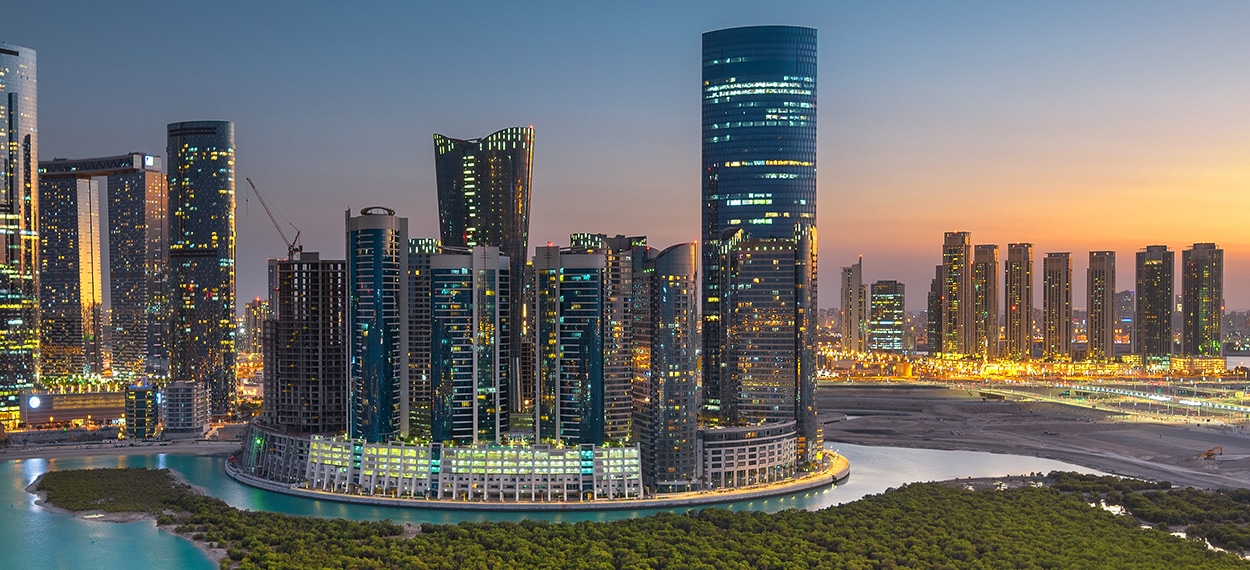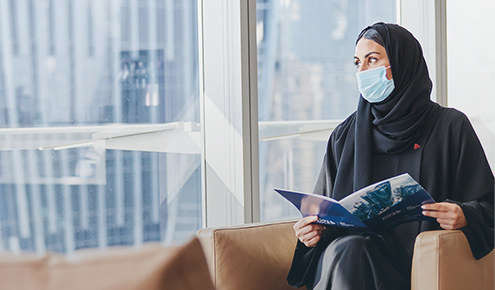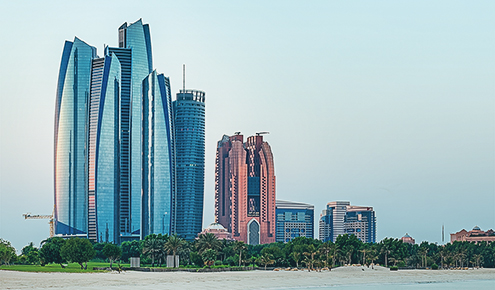Strategic Review Economic Overview
While economies around the world contracted sharply in early 2020 as a result of the COVID-19 pandemic, economic activity showed positive signs in the second half of the year, as nations emerged from the strictest lockdowns in Q2’20 and consumers and corporates benefitted from various support measures by governments and central banks. Global oil prices have also recovered during H2’20 and loosening restrictions supported a pickup in economic activity towards the end of the year, though substantial headwinds remain in 2021 as the world awaits full-scale vaccine rollout.

ECONOMIC ACTIVITY
Overall, global economic activity witnessed the steepest decline in a century, with advanced, emerging and developing economies all witnessing sharp contractions. Governments and central banks around the world introduced aggressive support measures for individuals, corporates and selected sectors to minimise the economic impact of the COVID-19 pandemic.
In the UAE, the externally facing nature of the economy made it highly vulnerable to the pandemic — oil and non-oil. We estimate real non-oil GDP contracting by 5.7% in 2020, with headline GDP falling by 6.5%, before recovering to 0.8% growth in 2021.
In 2020, the oil price remained well below the 2019 average, which is reflected in a number of our economic estimates, such as nominal GDP, government revenue and export earnings. Positively, oil prices have strengthened sharply in early 2021 and we have raised our oil price forecast for 2021 and now expect Brent crude to average USD 65.5 p/b.
Key non-oil sectors, such as trade, logistics, aviation and hospitality, were hit hard and continue to see a marked impact from weaker global demand and limited international travel. However, trade and logistics activity picked up post-lockdown and some positive signs in tourism-related areas were evident towards the end of the year.
Investment activity and project awards were also disrupted by the pandemic. Projects are being completed at a faster pace than new projects are being awarded, particularly in relation to ADNOC’s medium-term investment programme.
In addition, the hosting of Expo 2020 (shifted to October 2021–March 2022) should be positive for the UAE’s economic recovery, with the tourism, transportation, hospitality and retail sectors all set to benefit from the global recovery from the pandemic and the staging of this mega event.
GOVERNMENT SUPPORT AND REFORMS
The UAE Government and Central Bank introduced the Targeted Economic Support Scheme (TESS) in March to support the economy during the COVID-19 pandemic. The scheme’s AED 50 billion Zero Cost Facility was extended by six months to 30 June 2021. Banks participating in TESS are able to provide new loans and facilities to customers negatively affected by the pandemic, alongside loan payment deferrals (principal and/or interest). We see this extension as highly positive from an economic perspective, as a number of economic areas will likely remain impacted by the COVID-19 crisis in H1’21 until a vaccine is widely distributed globally.
The monetary support measures introduced by the UAE Government and Central Bank aimed to ensure ample liquidity and funds available for banks to continue to lend to the real economy. This had a positive impact on credit growth following the introduction of support measures, driven primarily by GREs, indicating that the counter-cyclical monetary measures entered the economy. As the COVID-19 lockdown eased, economic activity picked up and consumer confidence increased. There was also positive monthly growth in personal loans towards the end of the year, indicating some improvement in household sentiment, while real estate data also point to a pick-up in mortgage demand, driven by the lower property prices and interest rates.
In the US, the Fed reduced the Fed Funds Target Rate (FFTR) by 150 bps, while the Bank of England dropped their base rate by 65 bps, with indications that this low interest rate environment is likely to continue for the foreseeable future.
PMI data at year end indicated that export orders (including services) continued to contract, whilst corporates were lowering prices to support demand. Companies are focusing on maintaining liquidity and preserving cash flow in the near term, with lower revenues and the ongoing uncertain economic backdrop. Moreover, signs of job losses and pay cuts across affected sectors will be a headwind to the recovery, while deflation gained pace during the year with a sharp fall in fuel prices, given the pandemic and ongoing downward pressure on real estate prices.
LOOKING AHEAD
For the UAE, we forecast consolidated government spending to rise gradually in 2021, with a narrowing of the consolidated deficit and stronger revenue growth, including higher oil income. Key service sectors, including travel, leisure and hospitality, are expected to drive the recovery, though they will continue to be impacted by pandemic-related measures and look to remain below pre-pandemic levels in the coming year.
COVID-19 accelerated trends such as the shift towards digitisation, increased working from home, reduced business travel and the retreat of globalisation. While these trends will play out over the coming years, and may lose some momentum as a result of vaccine introduction or political developments, they have already ushered in widespread structural change in the behaviours of consumers and corporates worldwide.
A resurgence in global COVID-19 cases is a key risk during the upcoming year, which will continue to be defined by low interest rates with elevated uncertainty until the large-scale deployment of an effective vaccine, though we foresee a further pickup of overall activity and the potential for an uneven macroeconomic recovery.
Recommended

Risk Management
Risk management lies at the core of ADCB’s position as a trusted and systemically important bank in the UAE.
Read more
Management Discussion & Analysis
ADCB stepped up to the mark with a holistic response to the wide-ranging challenges of COVID-19, balancing the provision of vital support for our customers with measures to ensure the Bank’s continued financial resilience.
Read more